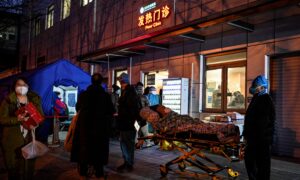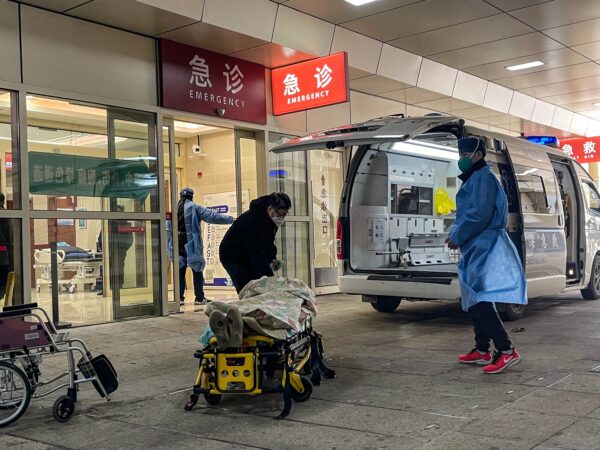Multiple Chinese Government Agencies Close Down Temporarily Due to Surge in COVID Infections
Several Chinese government organizations, including police stations, pandemic control centers, and judicial offices, are closed down temporarily amid a COVID-19 outbreak sweeping across China.Some claim that the majority of their staff have tested positive for COVID, according to the Chinese language edition of The Epoch Times, which reached out to a few agencies on Dec. 23 and Dec. 24. Shandong Police Station The household registration section of Hongxing West Road Police Station in Jining City, in China’s northeastern Shandong Province, has been shut down, according to an officer at the station. “Only two police tested negative for COVID, and I am one of them,” he told the publication on Friday, adding that there were about 40 police in the station. “The household registration service is closed for the time being because all those working there are infected by COVID,” the officer said, who spoke on the condition of anonymity. Ms. Xiao (pseudonym), a resident in Flushing, New York, told The Epoch Times that one-third of the police in Jining are infected with COVID and can’t go back to work. “I have a relative who is a police in Jining,” she said. “He told me that more police in the city are infected with COVID, and there isn’t a single police in sight in the street now.” Judiciary Office in Beijing China’s capital Beijing is among the hardest-hit cities in the country amid the recent outbreak. Hospitals and crematoriums are overwhelmed, and pharmacies are out of cold and fever medicines. A staff member of Jinzhan Area Judiciary Office in Chaoyang District of Beijing told the Chinese language edition of The Epoch Times that the office closed because about 90 percent of its employees have COVID. “We only have about 10 percent of our staffers coming back to the office, but we are not open to the public,” an employee who requested to remain anonymous said on Dec. 23. “Those infected by COVID are all at home,” he added. Shanghai Police Station Shanghai has experienced outbreaks since the end of March this year, and the financial hub was under stringent lockdowns before authorities lifted the zero-COVID policy in early December. A patient on a stretcher arrives at the emergency area in Huashan Hospital in the Jing’an district in Shanghai on Dec. 23, 2022. (Hector Retamal/AFP via Getty Images) The publication called a police station in Shanghai’s Changning District on Dec. 24. The officer who answered the phone said the police station would be closed due to “testing of the equipment” from Dec. 24 to Dec. 29. “We are not able to provide any service or accept criminal reporting. You need to report to other police stations,” he said. When asked if the police station was closed due to COVID infections, the officer refused to comment. Changsha Pandemic Prevention and Control Center The pandemic prevention and control center of Changsha City, in China’s southern Hunan Province, suspended its operations. “We are not open. We are [infected by COVID] as well, which is normal, isn’t it?” a staffer told the publication on Dec. 23. He declined to give his name, fearing retaliation from authorities. “We don’t have access to antigen test kits or cold medicines now, which have been sent to hospitals,” he said. He kept coughing during the phone call and said he didn’t have a fever. He added that the municipal pandemic prevention and control center no longer oversees pandemic control work. He didn’t say how long the agency would remain closed. Radio Free Asia (RFA) reported on Dec. 23 that “white lung” cases have occurred in multiple Chinese cities, including Beijing and Wuhan, where COVID first broke out in December 2019. The “white lung” is a typical symptom of patients during the Wuhan outbreak three years ago. When a patient with severe pneumonia undergoes an X-ray, the lungs appear white, indicating that they have been severely eroded by inflammation, which can be fatal. In a rare move for the Chinese Communist Party, Wang Huaqing, an expert of China’s Center for Disease Control and Prevention (CDC), admitted at a press conference on Dec. 20 that there is a “risk of severe illness and death” after patients are infected with the Omicron mutant strain. Lin Cenxin and Zhang Danxia contributed to this report. Sophia Lam joined The Epoch Times in 2021 and covers China-related topics.

Several Chinese government organizations, including police stations, pandemic control centers, and judicial offices, are closed down temporarily amid a COVID-19 outbreak sweeping across China.
Some claim that the majority of their staff have tested positive for COVID, according to the Chinese language edition of The Epoch Times, which reached out to a few agencies on Dec. 23 and Dec. 24.
Shandong Police Station
The household registration section of Hongxing West Road Police Station in Jining City, in China’s northeastern Shandong Province, has been shut down, according to an officer at the station.
“Only two police tested negative for COVID, and I am one of them,” he told the publication on Friday, adding that there were about 40 police in the station.
“The household registration service is closed for the time being because all those working there are infected by COVID,” the officer said, who spoke on the condition of anonymity.
Ms. Xiao (pseudonym), a resident in Flushing, New York, told The Epoch Times that one-third of the police in Jining are infected with COVID and can’t go back to work.
“I have a relative who is a police in Jining,” she said. “He told me that more police in the city are infected with COVID, and there isn’t a single police in sight in the street now.”
Judiciary Office in Beijing
China’s capital Beijing is among the hardest-hit cities in the country amid the recent outbreak. Hospitals and crematoriums are overwhelmed, and pharmacies are out of cold and fever medicines.
A staff member of Jinzhan Area Judiciary Office in Chaoyang District of Beijing told the Chinese language edition of The Epoch Times that the office closed because about 90 percent of its employees have COVID.
“We only have about 10 percent of our staffers coming back to the office, but we are not open to the public,” an employee who requested to remain anonymous said on Dec. 23.
“Those infected by COVID are all at home,” he added.
Shanghai Police Station
Shanghai has experienced outbreaks since the end of March this year, and the financial hub was under stringent lockdowns before authorities lifted the zero-COVID policy in early December.

The publication called a police station in Shanghai’s Changning District on Dec. 24. The officer who answered the phone said the police station would be closed due to “testing of the equipment” from Dec. 24 to Dec. 29.
“We are not able to provide any service or accept criminal reporting. You need to report to other police stations,” he said.
When asked if the police station was closed due to COVID infections, the officer refused to comment.
Changsha Pandemic Prevention and Control Center
The pandemic prevention and control center of Changsha City, in China’s southern Hunan Province, suspended its operations.
“We are not open. We are [infected by COVID] as well, which is normal, isn’t it?” a staffer told the publication on Dec. 23. He declined to give his name, fearing retaliation from authorities.
“We don’t have access to antigen test kits or cold medicines now, which have been sent to hospitals,” he said. He kept coughing during the phone call and said he didn’t have a fever.
He added that the municipal pandemic prevention and control center no longer oversees pandemic control work. He didn’t say how long the agency would remain closed.
Radio Free Asia (RFA) reported on Dec. 23 that “white lung” cases have occurred in multiple Chinese cities, including Beijing and Wuhan, where COVID first broke out in December 2019.
The “white lung” is a typical symptom of patients during the Wuhan outbreak three years ago. When a patient with severe pneumonia undergoes an X-ray, the lungs appear white, indicating that they have been severely eroded by inflammation, which can be fatal.
In a rare move for the Chinese Communist Party, Wang Huaqing, an expert of China’s Center for Disease Control and Prevention (CDC), admitted at a press conference on Dec. 20 that there is a “risk of severe illness and death” after patients are infected with the Omicron mutant strain.
Lin Cenxin and Zhang Danxia contributed to this report.












